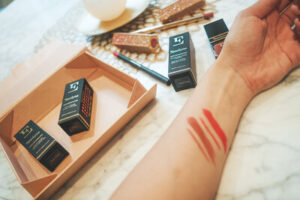Article Cover Photo: © Studio MNL via canva.com
When many of us think about skin care, moisturising is usually the first thing that comes to mind. Naturally, moisturising our body is just as important as moisturising our face, but with the variety of creams, lotions, body butters and other skin care products on the market, choosing the right body moisturiser for your needs can be quite confusing.
Lotion vs cream? Cream vs body butter? Is there actually a difference between all of these hydrating body care products?! You’re about to find out, as this article looks at all the things that make these products different, and could help you find the best for your skin care needs.
This article contains affiliate links
What is Body Lotion?
Body lotion is essentially a light-weight ‘cream’, made with a high water content and very little oil. On the viscosity spectrum of body products, body lotions are at the lighter end and just like creams, they help to keep your skin soft, smooth and hydrated, whilst being suitable for any skin type.
Since lotions have a much higher water content, this yields a light and non-greasy texture – one that’s ideal for daily use and for prevention against any dryness and flaking that the skin may develop over time. And because of this high water content and non-greasy texture, the skin absorbs lotions much more easily than it would thicker products, making them a favourite for daily use, particularly after morning showers. They are also perfect to use during the hot summer months, again, thanks to the ease of absorption.
Applying a daily dose of body lotion at the end of a hot shower is ideal for maintaining your skin’s softness and youthful elasticity. Although undeniably soothing, the hot water from your daily shower can be potentially damaging to the skin barrier, and applying lotions (or creams) suitably counteracts these adverse effects. Rub your lotion on slightly damp, towel dried skin and notice how quickly your skin will absorb it!
**Editor’s Tip** Always look for body lotions that count both hyaluronic acid and ceramides as ingredients to help gradually enhance the skin’s water-retaining abilities.

What is Body Cream?
Body creams are on the thicker end of the viscosity spectrum of body moisturisers, thanks to higher oil and lower water content. That extra thickness provides an extra dose of moisture that feels positively delectable when applied over the body, making them ideal for anyone with moderately dry skin.
Whereas body lotions are excellent for use in the day time thanks to how easily they are absorbed, body creams are perfect for evenings, and applying a decadent body cream perfectly rounds off a relaxing warm bath or a spa-like body scrub. Massage a healthy dose of body cream after stepping out of the tub and patting yourself dry, before slipping into your favourite dressing gown and winding down for the evening. Summarily, body creams are a simple, yet sure way of showing some love to your skin and elevating your cosy, evening ritual.

Body Cream vs Body Butter
Whilst body creams are certainly thicker than lotions, they are still not as rich as body butters. If you want to give your body a really creamy treat, opt for a decadent body butter. It will feel even more luxurious upon application and is best for treating especially dry and dull skin.
When compared to body lotions, body creams already contain a higher ratio of essential oils, but body butters up their game by adding natural butters to the mix. Liquid oils are combined with fatty solids such as shea butter, mango butter or cocoa butter and this makes for a very thick consistency that is packed with hydration. With body butters, a little goes a long way, and you’ll find yourself applying a lot less than you would lotions or creams.
The only down side to body butters is that they take longer for the skin to absorb. We suggest applying them in the evening, before slipping into your bed, and letting them work their magic during the night. On the other hand, body creams are quicker to be absorbed by the skin, but certainly not as easy to soak up as lotions. Absorption ultimately all boils down to the amount of water content – the higher the water content, the more easily absorbed.

Lotion vs Cream: Which is Best for Me?
When choosing between a moisturising lotion vs cream or butter you should always consider your skin type, which area of the body you’re targeting and the weather conditions.
For example, due to regular washing and the habitual use of sanitizers, our hands are more likely to experience dryness and irritation, which is why rich hand creams feel so good when massaged into our hands. The thickness and higher oil content found in creams and butters make them a more effective option for protecting your hands, and the range of delicious scents certainly add to their appeal!
**Editor’s Tip** Try coating your hands and feet in body cream or butter before bed, before slipping on cotton gloves and socks to allow the creams to full absorb into the skin. Don’t forget to give special attention to your knees and elbows!
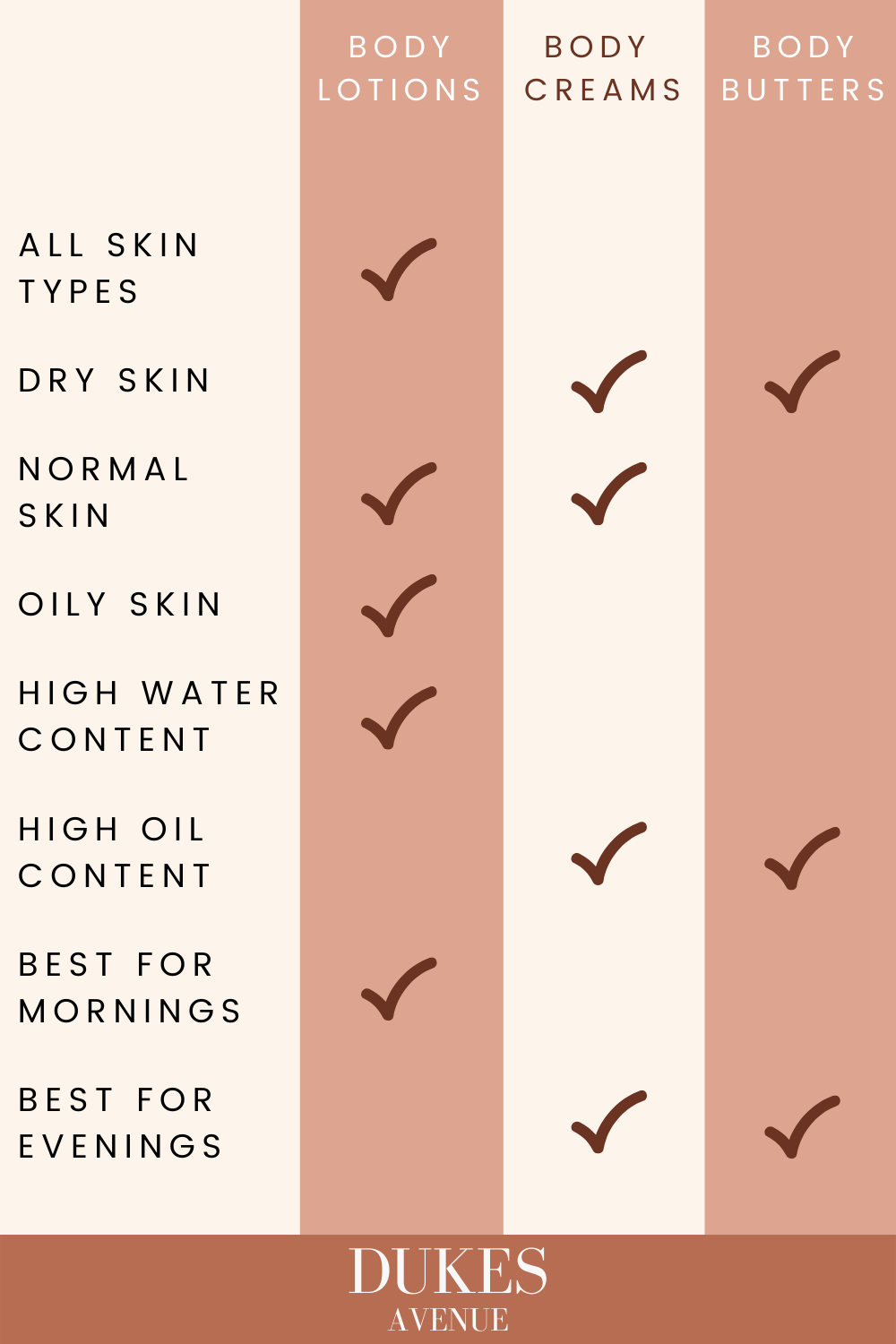
Is Lotion or Cream Better for Dry Skin?
When it comes to very dry skin, the creamier the moisturiser the better! We all get patches of very dry skin at times, especially around the knees, elbows and feet, and to soften and smooth out these roughened areas, applying a light lotion doesn’t always cut it.
Although lotions certainly help to hydrate the skin, their light and watery composition does not combat rough and scaly skin as effectively as creams and butters. In fact, we would recommend using lotions as part of your preventive, daily skin care routine. Applying refreshing body lotion after a hot, steamy shower is probably the best way to maintain healthy, normal skin and avoid developing super dry skin or other potential skin conditions.
That being said, if you already suffer from itchy, dry skin, put aside the lotions and opt for thick creams and body butters until your skin starts to feel smooth and soft once again. Body creams and body butters are formulated to be oily and creamy to better protect your skin against harsh, environmental pollutants and provide a richer concentration of much needed hydration.
If your skin is so dry that it has cracked, if you suffer from very sensitive skin or skin conditions such as eczema or psoriasis, it is best to avoid lotions, creams and butters altogether as these might irritate your skin further. Instead, apply a soothing and moisturising ointment, preferably one prescribed by your dermatologist, until your condition abates or any cracks and cuts have healed.
Is Lotion or Cream Better for Oily Skin?
Readers with oily, acne prone skin know how important it is to pick the right moisturiser. Using a product which is too thick and oily can quickly clog up the pores and cause an unwanted acne breakout, whilst not moisturising at all will leave your skin feeling dry and appearing unhealthily dull. Luckily, using a light, hydrating lotion strikes the perfect balance. It sooths and moisturises the skin just enough without causing irritation and applying a small amount daily keeps your skin feeling soft and smooth.
Naturally, that does not mean you cannot enjoy body creams and butters at all. Whilst reserving body lotion for the areas in your body which generate the most sebum, such as the chest and back, feel free to gently rub some rich body cream or butter on your legs and feet after a luscious bath. Your feet will thank you for it, especially after a long, tiring day.
If you enjoy reading skin care content and learning more about how to care for your skin, be sure to check out our other skin care articles on topics like dermablading, niacinamides and facial rolling in the Dukes Avenue Beauty section.
You might also want to check out our ultimate guide to creating The Perfect Body Skin Care Routine.
Don’t forget to pin this article if you found it helpful, and follow Dukes Avenue on Pinterest for more!
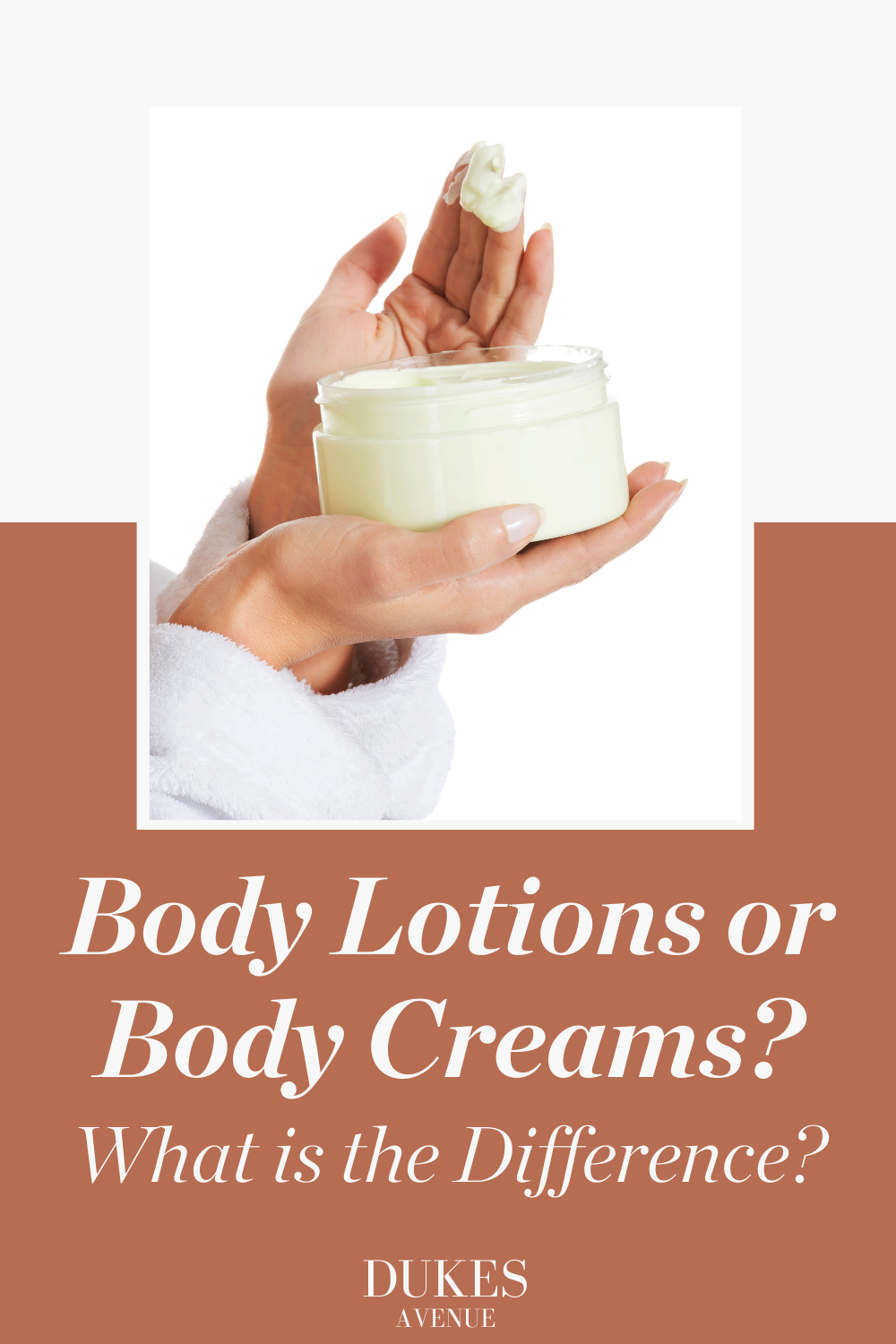
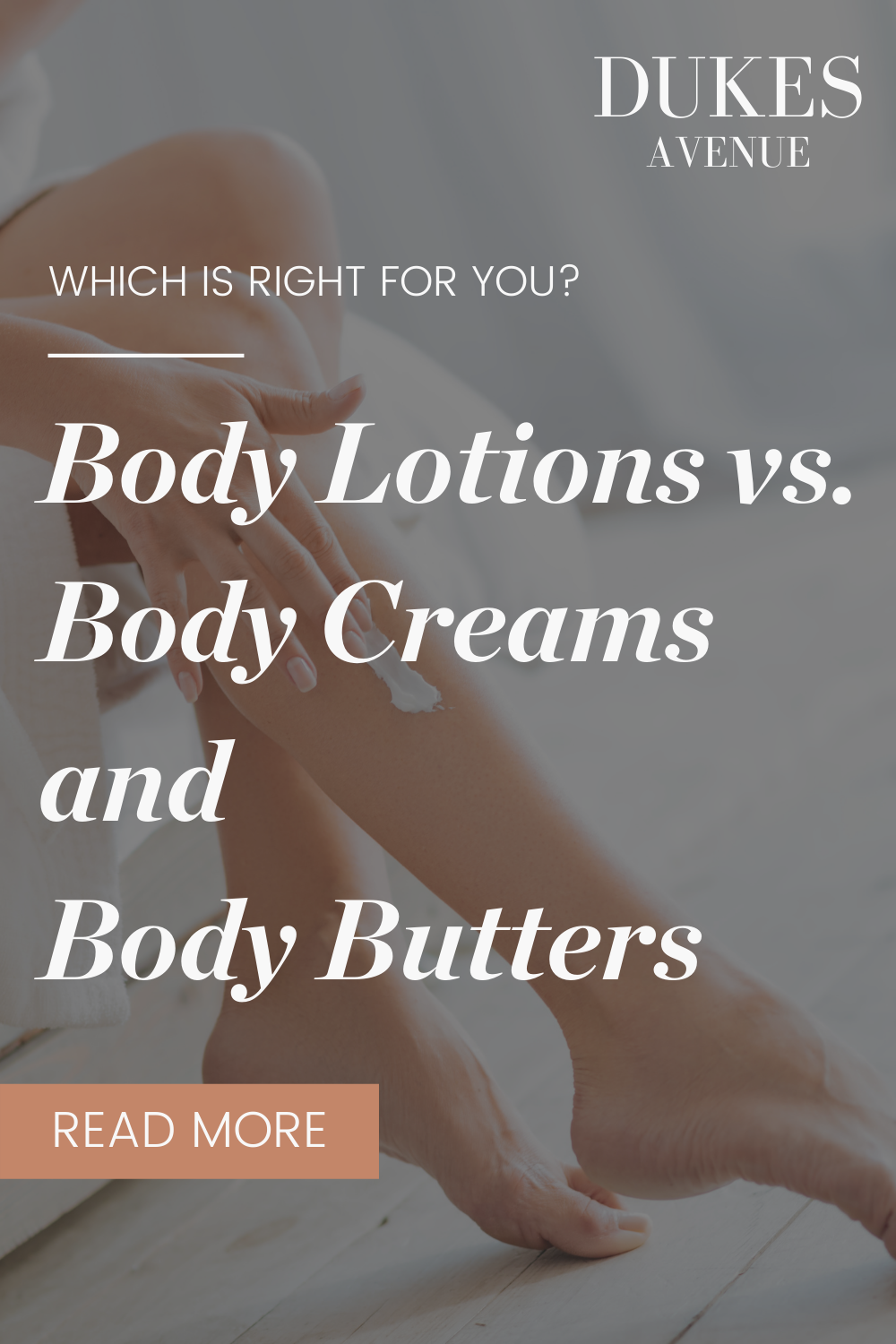
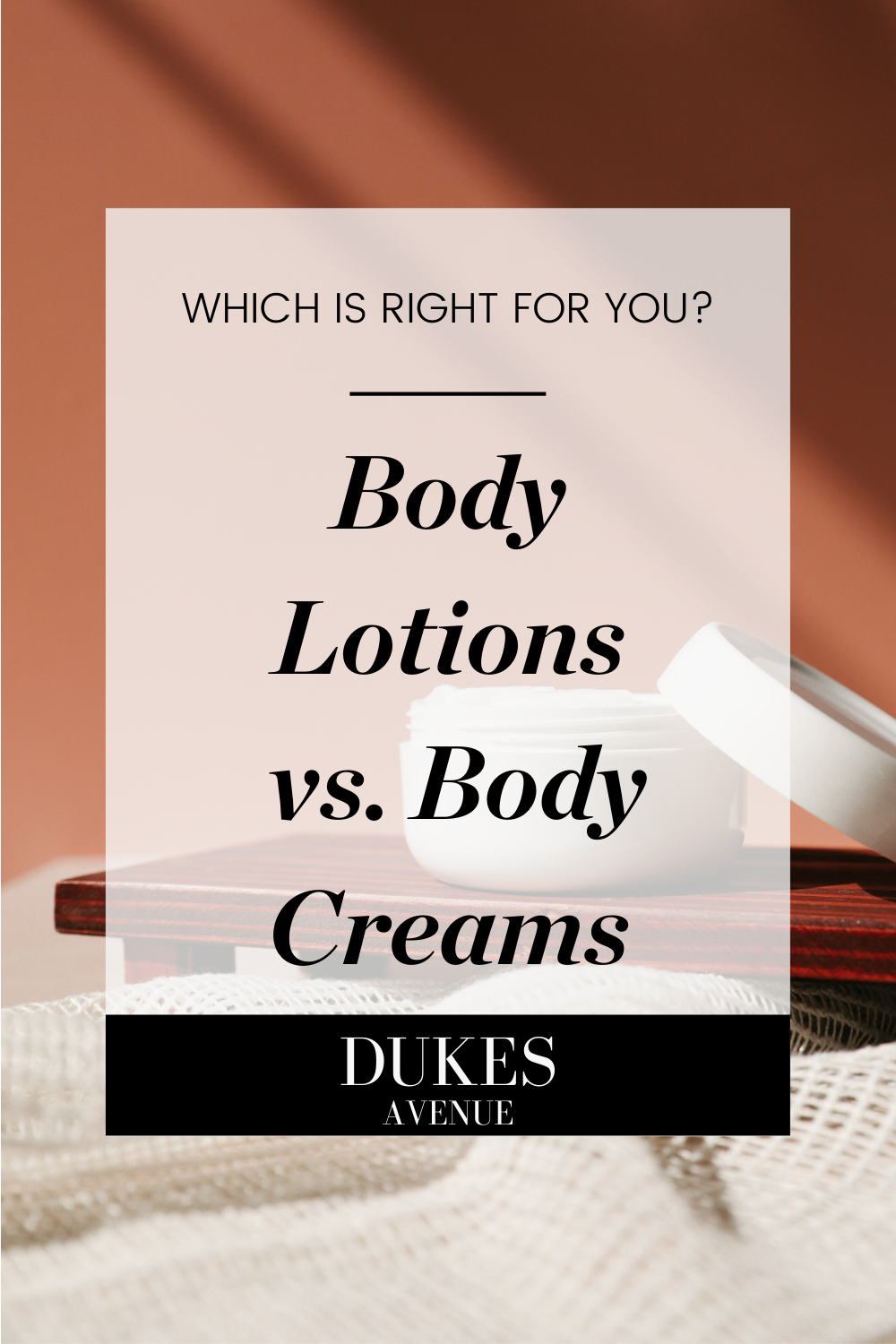

Christine is a woman with an eclectic range of artistic tastes. As a professional soprano with a Bachelor's Degree in Music, she carries over 15 years of experience in the classical music scene, both locally and abroad. Her passion for music is equalled by her love for literature and, more recently, Christine graduated for a second time with a BA in English.
-
Christine Barbarahttps://dukesavenue.com/author/christine-barbara/
-
Christine Barbarahttps://dukesavenue.com/author/christine-barbara/
-
Christine Barbarahttps://dukesavenue.com/author/christine-barbara/
-
Christine Barbarahttps://dukesavenue.com/author/christine-barbara/


